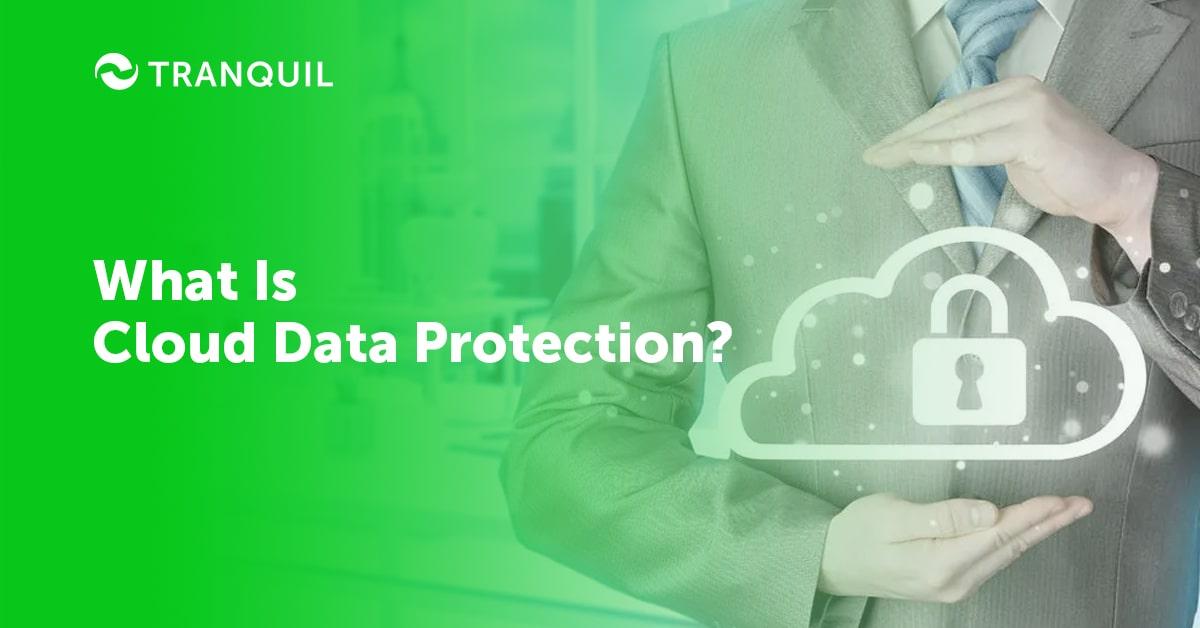
We hear a lot of talk about ‘cloud’ in terms of IT and software.
Most of us know that it simply means storing data and apps on remote servers rather than your own.
But how safe is it to do that?
Is your data protected? Read on to know more.
ALSO READ: On-Premise or Cloud Database Hosting
Cloud data protection refers to a method of data protection that safeguards data in the cloud, whether it is moving, static, or stored.
It is so designed to provide the best protection and security to data storage.
Fundamentally, it both offers, and ensures the availability of processes and services like the following:
Fundamentally, cloud cyber security refers to the process of ensuring that the data of an organization is safe in the cloud.
This is regardless of where it is located, whether it is static or moving, and regardless of whether it’s internally or externally managed.
ALSO READ: Must-Have HRMS Modules and Features

With an increasing number of companies moving to cloud data and app storage rather than developing and maintaining their own data centres, cloud data protection has become more important than ever.
The shift to the cloud has transformed the role of IT to an international enabler of business, from a local provider of safe cloud storage.
Strong IT has enabled things like distribution of data, multi-cloud adoption, and secure hybrid cloud.
It also protects data from unwanted exposure and adheres to regulatory requirements by governments as well as industry – which are becoming increasingly stringent.
Leaders in the IT industry are turning to cloud data security platforms capable of offering comprehensive security for SaaS apps, data centres, and the internet too.
This helps to make sure that the configurations in public cloud apps align with the best practices.
Only then can regulatory compliance be adhered to, and data be protected effectively.
The cloud model involves shared responsibility; this means that along with the cloud vendor, businesses are also motivated to prevent data breaches.

Organizations today gather mountains of data – from mundane information to confidential business information and sensitive financial data.
They are also increasingly preferring to move and store data in the cloud, whether private, public, or hybrid cloud storage, SaaS, etc.
Naturally, this has also given rise to security concerns in cloud computing.
Businesses are finding out that protecting and safeguarding all of their information in various environments can be complex and daunting.
Here are the reasons why:
o Loss or theft of critical data
o Breach of security
o Malware
o Bugs in the app that make it vulnerable
Companies have to maintain compliance with data protection regulations and privacy laws as applicable in their countries; for example, in the EU, it is GDPR, and in the US, it is HIPAA.
Bear in mind, however, that establishing and administering policies related to security across numerous cloud environments can be extremely difficult.

It is possible for companies to store their data in the cloud and security be given to it.
Here is what they need to know first:
ALSO READ: ERP vs CRM
Armed with this information, organizations should deploy automated, consistent, and seamless cloud data protection measures.
This should enable them to identify, categorize, track, and safeguard their data and applications across numerous environments.
These measures should also be able to differentiate between routine activities and abnormal actions.
Ideally, the data protection measures must be built from scratch to ensure maximum performance and scalability.
The platform should be globally distributed so that your users can access their apps easily and quickly.
This means you will need to partner with a reliable network provider so that your users can experience reliable and optimal performance.
ALSO READ: Benefits of ERP in Accounting and Financial Management
To implement extensive and thorough protection for your cloud data, you must attempt to have a zero-trust framework.
Search for providers who can deliver that.
With zero trust, you can handle the particular cloud security challenges faced by your business.
This can be done by using content, device, user, application, and other context to build trust before making a connection.
As your company utilizes cloud services to be more flexible, zero trust enables you to provide proactive protection to your resources by controlling access.
This gives you an edge over cyber threats and attacks.
Data security in cloud computing is typically provided via disaster recovery, cloud storage, and backups.
These methods are supposed to guarantee that the data stays in the possession of the organization if there is a breach due to malware, loss of data, or any other activity that would take advantage of vulnerable cloud data.
The most common methods of data protection include access control, multiple-factor authentication, and secure deletion; however, these measures are more to do with data security rather than the protection of data.
Businesses employ these measures to prevent access by malicious users and negligent employees or just protect it from them.
But data breaches are another story altogether, and standardized security policies are important here.
Cloud workloads are the most susceptible to attack, and hence it is critical that companies and their cloud providers have a clear understanding of their responsibilities about mitigating data risk.
ALSO READ: What is a POS System?

Cloud data protection offers numerous benefits to companies.
Let’s take a look at them:
When creating a protection program, most companies forget to do the groundwork – and this can complicate matters once the initial stages of developing such a program are through.
To avoid these pitfalls, you need to follow these best practices:
Like an inventory of materials or products, make an inventory of the sensitive data you want to protect.
Record where it is stored, and how you can protect it.
This will help you greatly when you want to implement a protection program.
Think of it as putting your cash in a safe to protect it – you would obviously note down how much you have put in!
ALSO READ: Influence and Importance of ERP System in Different Industries
Using multiple-factor authentication is a great deterrent to unauthorized access, and protects your cloud data and resources.
However, hackers can impersonate users and access your critical data.
With encryption, the data is scrambled, and passcodes are generated randomly to give you additional security.
These encryption keys are sent only to authorized users.
There are numerous vendors who offer data protection services, with most offering you top-notch security that is superior to others.
However, you should look for someone who develops data protection in the cloud that is meant for the cloud and uses a zero-trust framework.
This will protect data between cloud operations, and will also ensure that you maintain compliance with regulations by working with organizations in charge of cloud compliance.
ALSO READ: How Do ERP and Cloud Computing Differ?

While the cloud offers multiple benefits to businesses, it does have its fair share of challenges.
What are they? Let’s find out:
Today there are several tools like SWG, CASB, CSPM, etc., that provide data protection for the entire organization.
In spite of this, there are gaps between teams and products.
This can complicate things and lead to cross-team function redundancy; it can also reduce visibility as well as control over data exposure across apps.
Reports say that the majority of traffic generated through Google search is encrypted.
Hence, in case your data protection measures are not up to the mark, and you are unable to control your data in the encrypted traffic, your data is likely to be exposed and misused.
This is more so for SaaS apps that depend on encrypted and secure connections to the app for data exchange.
Cloud security and privacy often seem mutually exclusive – especially when you use public clouds.
The majority of data protection measures give limited information to enable decision-making regarding data usage in the cloud.
Not being able to see the full picture, like the users who are trying to gain access, their location, and the status of the app makes it difficult to exercise control to ensure secure and efficient use of data.
ALSO READ: How Cloud-ERP Software Helps Saudi Businesses?
When you divert internet traffic through the security measures in your existing infrastructure, it is likely to slow down app performance, leading to frustrated users.
You can add more devices to boost performance, but that means heavy expenditure – and it’s not the most practical thing to do.
The legacy architecture was not really meant to manage sudden surges in remote access.
The cloud is here to stay thanks to the innumerable benefits it offers. If you have not moved to the cloud yet, allow us at Tranquil to show you how you can benefit. Book a demo at your convenient time, and we will explain how it works.